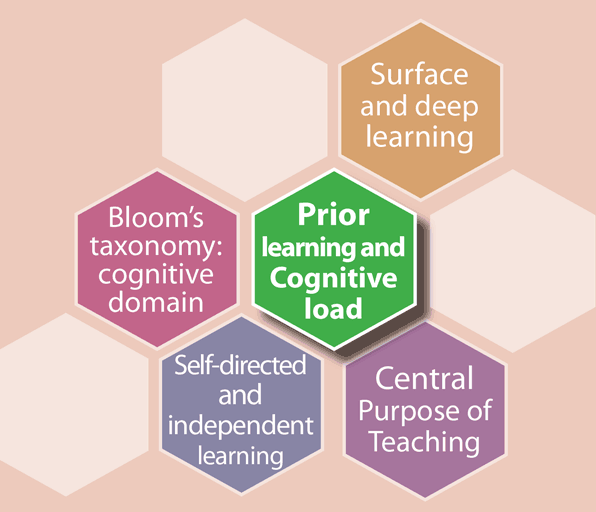Introduction
Understanding the central role of prior learning is key to effective teaching. No one learns anything that is not somehow (well) connected to something they already know. The better and stronger the connection then the easier (and maybe the faster) new learning can be.
Learning Objectives (what you can reasonably expect to learn in the next 15 minutes):
- Describe ways that prior learning affects future learning.
- Identify examples of light and heavy cognitive load.
To what extent are you now able to meet the above objectives? Please record your self-assessments. (0 is not at all and 5 is completely)
First, think about your own learning experiences. Recall a time or two when prior learning helped you to learn and when it hindered your learning. Were there times when you found learning quite intellectually demanding? What do you think may have contributed to your challenges?
Prior Learning and Cognitive Load

Simply put, if prior learning is substantial, correct, and accessible (learners remember it and can use it in the new learning task) then they have a strong foundation and potential for new, related learning1. On the other hand, if the prior learning is inadequate, inaccurate, and inert then the student is going to have some challenges (high cognitive load) that may be overcome by hard work and good teaching. The metaphor of weight training works very well. The same objective weight is experienced differently by different people depending on how much they have trained those specific muscles. The more their muscles have been prepared the less the load and the more they can lift. Similarly, the more learning in a related area the more people can learn or the lighter the cognitive load.
Learners come to medical school with very strong but varied academic backgrounds. Students experiencing difficulties learning a particular subject have come to see me for help studying. Often they are doing poorly in some subjects and with little effort are doing fairly well in others. They were surprised to discover that their previous university courses helped them with their learning. Where they lacked prior knowledge (often in anatomy) they struggled. (Some of the responsibility may rest not with the student but with the courses. See related CORAL Cells especially "Surface and Deep Learning".) Metaphorically, we take all kinds of athletes but train everyone to be high quality swimmers. Unexpectedly, those with some swimming skills do better than former tennis players. (Similarly, pre-clerkship and clerkship are somewhat disconnected. While we want people to do the front crawl on the wards we spend most of our time in pre-clerkship teaching them to do the butterfly. No wonder many students find clerkship such a shock. Their prior learning has not adequately prepared them for the tasks (and the learning) we expect of them.
While substantial, correct, and accessible prior learning creates a strong potential for new, related learning, some learning may be inaccurate. This creates more challenges for a learner who may not see that what they think they know is wrong or incomplete. This inaccurate or insufficient learning needs to be first discovered then modified. This is often best done by working with the knowledge such as solving problems and other higher order tasks (see the CORAL Cell, "Bloom's Taxonomy".) Conscientious teachers will account for prior learning. They will accommodate different learners by first helping them to realize their gaps and errors, activating their prior learning, and then adding new depth and complexity to what they knew before. There are excellent ideas for meeting this and other challenges of prior learning in Ambrose et al (2010)1.

Check for Understanding
Self-assessment
Please complete the following very short self-assessment on the objectives of this CORAL cell. To what extent are you NOW able to meet the following objectives? (1 is not at all and 5 is completely)
To what extent WERE you able the day before beginning this Cell to meet the following objectives? (1 is not at all and 5 is completely)

Thank you for completing this CORAL Cell. We are interested in improving this and other cells and would like to use your answers (anonymously of course) along with the following descriptive questions as part of our evaluation data.
Thanks again, and come back soon!
The CORAL Cell Team
References and further reading
1 Ambrose SA, Brtidges MW, DioPietro M, Lovett MC, & Norman MK. How Learning Works: Seven Research-based Principles for Smart Teaching. San Francisco, CA: Jossey-Bass, 2010.
2 Wikipedia. https://en.wikipedia.org/wiki/Cognitive_load. Accessed September 18, 2017.
3 Young JQ, Van Merrienboer J, Durning S, Ten Cate O. Cognitive load theory: Implications for medical education: AMEE guide no. 86. Medical teacher. 2014 May 1;36(5):371-84.
NEJM Catalyst (March 2018); https://catalyst.nejm.org/cognitive-load-theory-implications-health-care/
Credits
Author: Marcel D'Eon, University of Saskatchewan
Series Editor: Marcel D'Eon
Reviewer/consultant: Deirdre Bonnycastle, University of Saskatchewan
